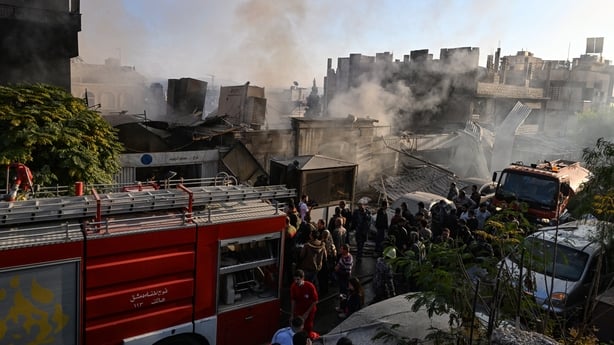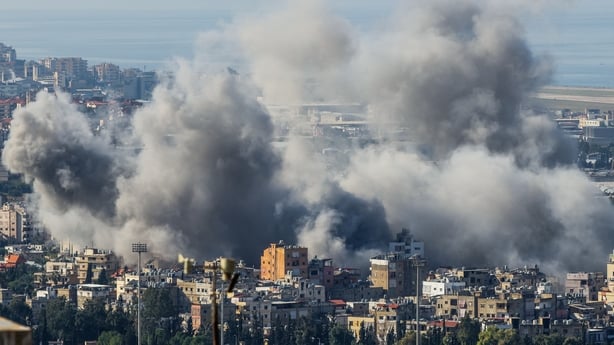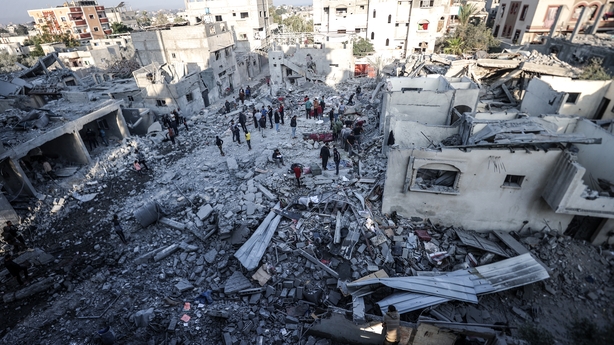A war monitor said Israeli strikes in and around Damascus killed 20 people including Palestinian militants and Iran-backed fighters, as attacks intensified during the Lebanon war.
The attacks coincided with an official visit to Damascus by Ali Larijani, a senior adviser to Iran's supreme leader Ayatollah Ali Khamenei, who met with Syrian President Bashar al-Assad.
Israel has ramped up strikes on Syria recently, including in areas near the Lebanese border mainly targeting bastions of Lebanese movement Hezbollah.
Israel has been at war with the Iran-backed group since September.
"The death toll from the Israeli strikes on the Mazzeh neighbourhood and Qudsaya rose to 20 people, in addition to 21 other wounded," the Britain-based Syrian Observatory for Human Rights said.
The Mazzeh neighbourhood, home to embassies, United Nations offices and security headquarters, has been the target of previous strikes blamed on Israel.
"Israeli strikes destroyed three multi-storey buildings in the Mazzeh neighbourhood, killing 10 people," said the Observatory, which has a network of sources inside Syria.
It added that the dead included at least three civilians and two non-Syrian Iran-backed fighters.
In Qudsaya, Israeli jets targeted "an apartment complex housing Palestinians, killing 10 people, including at least three members of the Palestinian Islamic Jihad movement," the monitor said.
An Israeli military spokesman said that "we attacked Islamic Jihad military bases in Syria", in a rare claim of responsibility for strikes on the war-torn country.
Islamic Jihad has fought alongside Hamas against Israeli forces in Gaza and has been at war with Israel before.
Earlier, Syria's defence ministry said the twin Israeli air strikes killed 15 people after "targeting residential buildings in the Mazzeh neighbourhood of Damascus and the Qudsaya area in the Damascus countryside".

Commanders in Lebanon's Hezbollah armed group and Iran's Revolutionary Guards based in Syria have been known to reside in Mazzeh, according to residents who fled after recent strikes that killed some key figures from the groups.
Iran and Hezbollah have been among the Syrian government's most important allies in the country's civil war that began in 2011.
Lebanon says 12 killed in Israeli strike near Baalbek
Lebanon said at least 12 people were killed in an Israeli strike targeting the main civil defence facility in the eastern Baalbek area, with the rescuers counting eight members among the dead.
"The Israeli enemy strike on a civil defence centre in Douris killed 12 people" with body parts recovered and rescue operations ongoing, the Lebanese health ministry said.
It condemned "the second Israeli attack on a health emergency facility in less than two hours" after an earlier attack killed Hezbollah-affiliated rescuers. Civil Defence said "eight personnel from the... Baalbek regional centre were killed".
Earlier, a senior Lebanese official signalled that Hezbollah is ready to pull its forces away from the Lebanese-Israeli border in any ceasefire, whilst rejecting Israel's demand for freedom to act against the Iran-backed group in the future.
Pressing its offensive against Hezbollah, Israel launched airstrikes on Beirut's southern suburbs for a third consecutive day, levelling more buildings in the area of the Lebanese capital controlled by the group.
Its terms require Hezbollah to remove fighters and weapons from areas between the border and the Litani River, which lies about 30km from Lebanon's southern border.

The United States and other world powers say a ceasefire must be based on UN Security Council Resolution 1701, which demands that areas south of the Litani be free of any weapons other than those of the Lebanese state.
Israel has dealt Hezbollah heavy blows since launching an offensive against the group in Lebanon in late September, unleashing airstrikes, sending troops into the south, and killing top Hezbollah leaders including Sayyed Hassan Nasrallah.
Despite the blows it has suffered, Hezbollah has kept up rocket fire into Israel and has been battling Israeli troops on the ground in the south, where Israel said six soldiers had been killed in combat.
Israel long complained it was never implemented, pointing to Hezbollah weapons and fighters at the border. Lebanon in turn accused Israel of violating the resolution, with Israeli warplanes regularly violating its airspace.
Plumes of smoke rose over Beirut as the strikes continued, while raids also reached southern Lebanon's Bint Jbeil, where overnight airstrikes and artillery shelling inflicted heavy damage on buildings and residential complexes, according to Lebanon's National News Agency (NNA).
The Israeli military said its fighter jets carried out a series of attacks in the southern Beirut area, targeting weapons warehouses, military headquarters and other infrastructures used by Hezbollah.
Five people were killed in airstrikes on the towns of Bazourieh and Jumayjimah, NNA reported.
Lebanese authorities confirmed 21 casualties from today’s strikes on Beirut’s southern suburbs, which have been largely evacuated.
According to Lebanon's health ministry, Israeli attacks have killed at least 3,386 people and wounded 14,417 across Lebanon since 7 October 2023.
Hezbollah attacks have killed about 100 civilians and soldiers in northern Israel, the Israeli-occupied Golan Heights and southern Lebanon over the last year, according to Israel.
HRW accuses Israel of 'war crime' and 'ethnic cleansing' in Gaza
Israel denied allegations by Human Rights Watch that Israeli forces had forcibly displaced Gazans and that their actions in more than a year of war amount to "crimes against humanity".
"Time and again, Human Rights Watch's rhetoric regarding Israel's conduct in Gaza is completely false and detached from reality," foreign ministry spokesman Oren Marmorstein said on X.
In a report, the New York-based rights group said it had "amassed evidence that Israeli officials are... committing the war crime of forcible transfer".
"Statements by senior officials with command responsibility show that forced displacement is intentional and forms part of Israeli state policy and therefore amount to a crime against humanity," Human Rights Watch added.
HRW said the 172-page report's findings were based on interviews with displaced Gazans, satellite imagery, and public reporting conducted until August 2024.

"Contrary to claims in HRW's report, Israel's efforts are directed solely at dismantling Hamas's terror capabilities and not at the people of Gaza," said Mr Marmorstein.
He also charged that Palestinian militant group Hamas "uses civilians as human shields and embeds terror infrastructure within residential areas".
"Israel will continue to operate in accordance with the law of armed conflict," the spokesman added.
According to the United Nations, 1.9 million Palestinians were displaced in Gaza as of October 2024. Before the start of the war on October 7, 2023, the territory's official population was 2.4 million people.
Israel launched its offensive in Gaza after Hamas's unprecedented attack that resulted in the deaths of 1,206 people, mostly civilians, according to an AFP tally of official Israeli figures which includes hostages killed in captivity.
Israel's retaliatory campaign has killed at least 43,736 people in Gaza, most of them civilians, according to figures from the Hamas-run territory's health ministry that the United Nations considers reliable.

